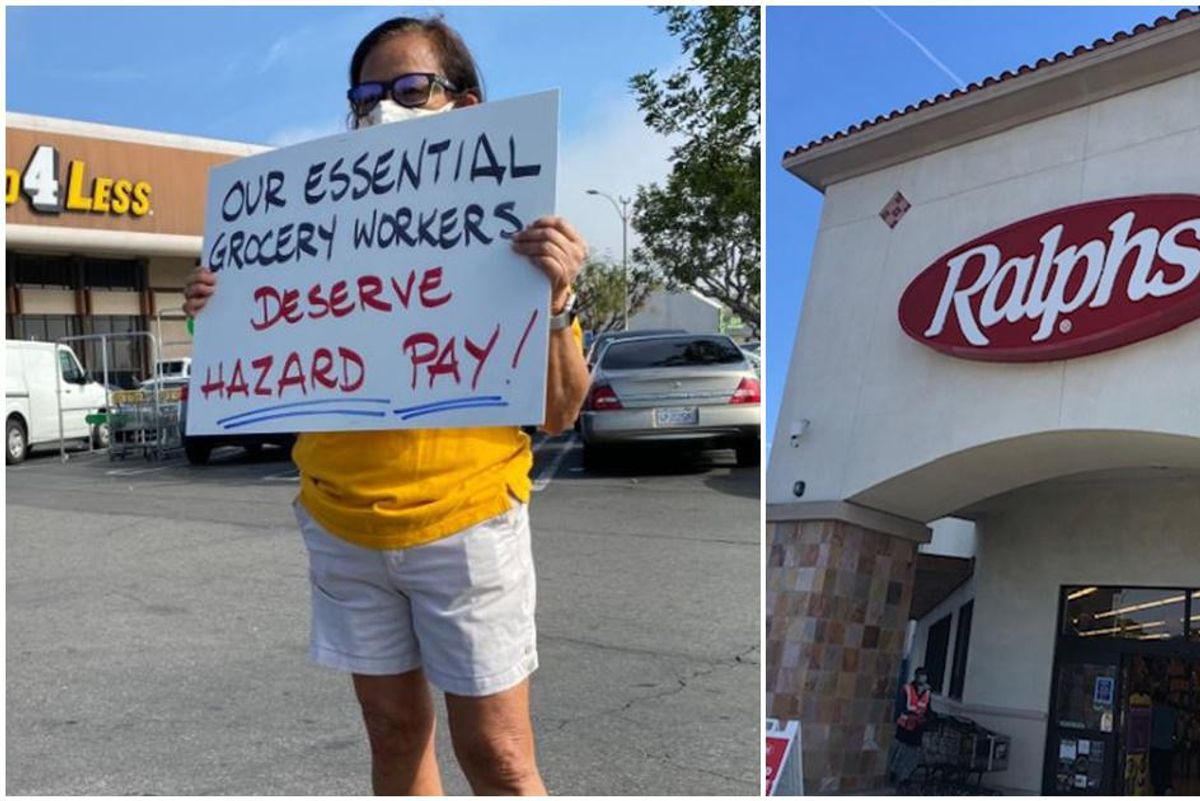Kroger closes two California grocery stores because it refuses to give 'hero pay' to workers

In the early days of the pandemic, people across the country flocked to grocery stores to stock up, fearing the worst. I remember rolling my cart into my local Ralph's, on the eastside of Long Beach, California, and the store was seriously picked over. The paper products aisle was like a ghost town and shoppers all had thousand-yard stares.
Everyone looked at each other seemingly thinking, "Do they have the virus?"
My heart caved when I got to the checkout aisle and saw the checker in a facemask with black gloves. There was a newly-installed clear shield that stood between us.
I remember thinking to myself, "All of these workers are going to get sick. Some will die." I can't imagine the stress and anxiety these people on the front lines felt, especially in the early days of the pandemic. The worst thing is that most had no choice. You can't just quit your job in the middle of a pandemic and hope to find new work.
They were all sitting ducks.
My experience at the Ralph's on Los Coyotes Boulevard inspired me to write an op-ed in Upworthy posing the idea we should have tip jars at our supermarkets. That way we can all thank the employees for the extreme risk they're taking so we could feed our families.

Eleven months later, my local Ralph's is being closed by its parent company, Kroger, because it refuses to pay $4 an hour in "hero pay" imposed by the city. Long Beach, the second-most populous city in Los Angeles County, is the first in America to give a mandated raise to its grocery store employees who've risked everything for their jobs.
Kroger is also closing a Food for Less in North Long Beach, a low-income neighborhood where discounted food items are a necessity, especially in these times.
On January 19, the City Council unanimously approved the 120-day hero pay ordinance. It applies to chain stores with 300 or more workers nationally and with 15 employees per store within the city, that devote 70% or more of its business to retailing food products.
It was signed into law the next day by Mayor Robert Garcia.
The ordinance comes at a time when grocery stores are making record profits due to the pandemic.
"Grocery workers are going in every single day and risking their life being exposed to the virus," Long Beach Councilwoman Mary Zendejas said. "Grocery businesses are experiencing a boom in their industry, they are making profits, record profits, on the shoulders of their employees, and they are not willing to share the profits with them."
Kroger said its sales rose 30% in March and increased more than 20% in April and May. It also reported a 92% boost in online sales in Q1 2020.
The company provided a $2 an hour bonus for its employees at the beginning of the pandemic, but it was phased out.
"As a result of the City of Long Beach's decision to pass an ordinance mandating Extra Pay for grocery workers, we have made the difficult decision to permanently close long-struggling store locations in Long Beach," a company spokesperson said in a news release. "This misguided action by the Long Beach City Council oversteps the traditional bargaining process and applies to some, but not all, grocery workers in the city."
What's even more irksome is that the stores are scheduled to close on April 17, 89 days into the 120-day period. Why not just wait it out an extra month?
Garcia vows to fight back against the Kroger closures because he believes it has the responsibility to compensate its workers for the extra danger they faced while the company raked in record profits.
"You have a corporation that, according to the Brookings Institute, they're making double what they normally make, they're making off the pandemic. And they're making it off the backs of these workers," Garcia said at a news conference at the Food 4 Less location slated to be closed.
"I don't think anyone who has shopped, over these last six months to a year, can look into the eyes of one of these workers and tell them that they don't deserve an additional few bucks an hour for the incredible work that they've been doing during this pandemic," he continued.
The pandemic is a serious topic for Garcia who lost both his mother and stepfather last year due to COVID-19. His work for the vaccine rollout in the city of 467,000 has been applauded by Governor Gavin Newsom and it was called a "model for the state" by The New York Times.
Kroger is well within its rights to shut down stores to avoid paying its employees a state-mandated bonus. But it's bloodless of the company to thank its employees — who heroically pulled it through the pandemic — by endangering their jobs.
A report in Safety and Health found that "grocery store workers who interact with customers may be five times more likely to contract COVID-19 than their colleagues who don't have direct contact with customers."
It also found that 24% of grocery store employees experienced at least mild anxiety associated with work.
"After all the hard work I've done to feed the needy families and everything and risk my life and my family's lives at home and they don't want to pay $4 extra an hour for four little months," said Robert Gonzales, who has worked in the industry for 26 years, and currently works at the Food 4 Less slated to close.
"And then it's over. What is the reason for this? You're going to hurt the elderly, the homeless people. We give donations every week to the homeless and needy families and they want to take that away" he added.
"To ask the North Long Beach community to make a choice: Jobs with dignity or food on the table. That's an unfair choice that the Kroger company is issuing to our community," Rex Richardson, vice mayor of Long Beach, said.
Garcia says the city will fight back against Kroger in court, but it's unclear what the legal system can do to stop a business from deciding to close its doors.
In the coming months, as the number of vaccinations rises and the number of cases falls, we will all happily put the pandemic era behind us. I hope that I can grab my cart and pull into my local Ralph's one day this summer and see them taking down the protective shields that stands between myself and the checker as well as the stickers on the floor that say, "maintain a six-foot distance"
But I most look forward to seeing the smiles on the checker's faces because, for the first time in ages, they won't be wearing masks. I'll tell them, "Thanks, we couldn't have made it without you." Let's hope that Kroger comes to the same realization, too.
- How one man is helping at-risk youth by providing a place to do ... ›
- Your little plastic pill bottles can make a major difference to the world ... ›
- Extremely positive 'bros' tried to help out a California beach town by ... ›
- America's dirty little secret: A lot of us don't want to go back to normal. - Upworthy ›
- Neighbor does an incredible act of kindness for single dad - Upworthy ›






 A Baby Boomer couple.via
A Baby Boomer couple.via  A Baby Boomer couple.via
A Baby Boomer couple.via 
 This is where Gabrielle tracks her rejection journey.
This is where Gabrielle tracks her rejection journey. Social rejection feels just like physical pain to the brain.
Social rejection feels just like physical pain to the brain. Asking questions can be a form of bravery.
Asking questions can be a form of bravery.

 Woman working, productively.
Woman working, productively.
 An exhausted mom and her baby.
An exhausted mom and her baby. A mom yawns while feeding her baby.
A mom yawns while feeding her baby.